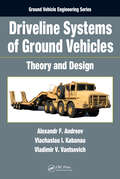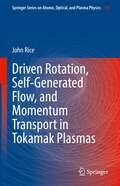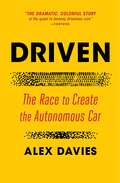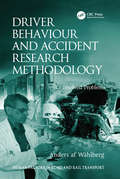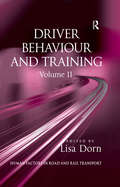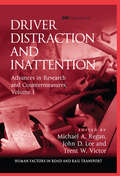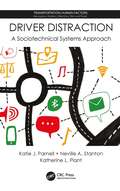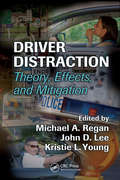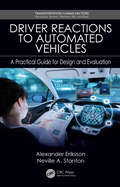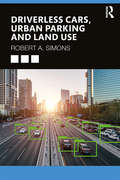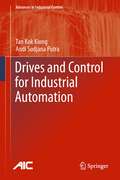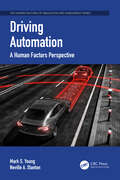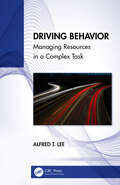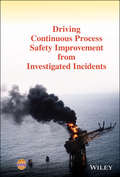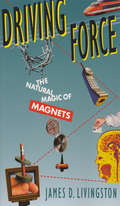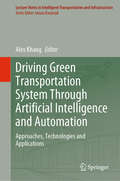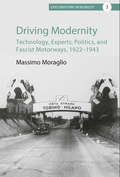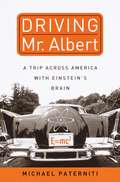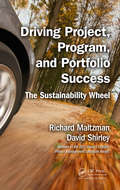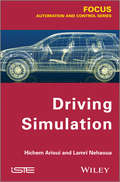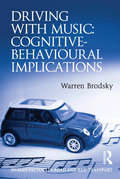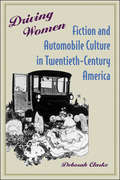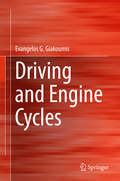- Table View
- List View
Driveline Systems of Ground Vehicles: Theory and Design (Ground Vehicle Engineering)
by Vladimir Vantsevich Alexandr F. Andreev Viachaslau Kabanau"With this book, Prof. Dr. Vantsevich brings a tremendous contribution to the field of Automotive Transmission and Driveline Engineering, including his innovative methods for optimum driveline synthesis, as well as his experience with the development of various hardware solutions, from the basic limited slip differentials to the most sophisticated
Driven Rotation, Self-Generated Flow, and Momentum Transport in Tokamak Plasmas (Springer Series on Atomic, Optical, and Plasma Physics #119)
by John RiceThis book provides a comprehensive look at the state of the art of externally driven and self-generated rotation as well as momentum transport in tokamak plasmas. In addition to recent developments, the book includes a review of rotation measurement techniques, measurements of directly and indirectly driven rotation, momentum sinks, self-generated flow, and momentum transport. These results are presented alongside summaries of prevailing theory and are compared to predictions, bringing together both experimental and theoretical perspectives for a broad look at the field. Both researchers and graduate students in the field of plasma physics will find this book to be a useful reference. Although there is an emphasis on tokamaks, a number of the concepts are also relevant to other configurations.
Driven: The Race to Create the Autonomous Car
by Alex DaviesAlex Davies tells the &“illuminating and important narrative&” (Steven Levy, author of Facebook: The Inside Story) of the quest to develop driverless cars—and the fierce competition between Google, Uber, and other companies in a race to revolutionize our lives.The self-driving car has been one of the most vaunted technological breakthroughs of recent years. But early promises that these autonomous vehicles would soon be on the roads have proven premature. Alex Davies follows the twists and turns of the story from its origins to today. The story starts with the Defense Advanced Research Projects Agency (DARPA), which was charged with developing a land-based equivalent to the drone, a vehicle that could operate in war zones without risking human lives. DARPA issued a series of three &“Grand Challenges&” that attracted visionaries, many of them students and amateurs, who took the technology from Jetsons-style fantasy to near-reality. The young stars of the Challenges soon connected with Silicon Valley giants Google and Uber, intent on delivering a new way of driving to the civilian world. Soon the automakers joined the quest, some on their own, others in partnership with the tech titans. But as road testing progressed, it became clear that the challenges of driving a car without human assistance were more formidable than anticipated. Davies profiles the industry&’s key players from the early enthusiasm of the DARPA days to their growing awareness that while this spin on artificial intelligence isn&’t yet ready for rush-hour traffic, driverless cars are poised to remake how the world moves. Driven explores &“the epic tale of competition and comradery, long odds and underdogs, all in service of a world-changing moonshot&” (Andy Greenberg, author of Sandworm: A New Era of Cyberwar).
Driver Behaviour and Accident Research Methodology: Unresolved Problems (Human Factors in Road and Rail Transport)
by Anders af WåhlbergThis book discusses several methodological problems in traffic psychology which are not currently recognized as such. Summarizing and analyzing the available research, it is found that there are a number of commonly made assumptions about the validity of methods that have little backing, and that many basic problems have not been researched at all. Suggestions are made as to further studies that should be made to address some of these problems. The book is primarily intended for traffic/transport researchers, but should also be useful for specialized education at a higher level (doctoral students and transportation specialists) as well as officials who require a good grasp of methodology to be able to evaluate research.
Driver Behaviour and Training: Volume 2 (Routledge Revivals Ser. #6)
by Lisa DornResearch on driver behaviour over the past two decades has clearly demonstrated that the goals and motivations a driver brings to the driving task are important determinants for driver behaviour. The importance of this work is underlined by statistics: WHO figures show that road accidents are predicted to be the number three cause of death and injury by 2020 (currently more than 20 million deaths and injuries p.a.). The objective of this second edition, and of the conference on which it is based, is to describe and discuss recent advances in the study of driving behaviour and driver training. It bridges the gap between practitioners in road safety, and theoreticians investigating driving behaviour, from a number of different perspectives and related disciplines. A major focus is to consider how driver training needs to be adapted, to take into account driver characteristics, goals and motivations, in order to raise awareness of how these may contribute to unsafe driving behaviour, and to go on to promote the development of driver training courses that considers all the skills that are essential for road safety. As well as setting out new approaches to driver training methodology based on many years of empirical research on driver behaviour, the contributing road safety researchers and professionals consider the impact of human factors in the design of driver training as well as the traditional skills-based approach. Readership includes road safety researchers from a variety of different academic backgrounds, senior practitioners in the field of driver training from regulatory authorities and professional driver training organizations such as the police service, and private and public sector personnel who are concerned with improving road safety.
Driver Distraction and Inattention: Advances in Research and Countermeasures, Volume 1 (Human Factors In Road And Rail Transport Ser.)
by John D. LeeIt is estimated that, in the United States, around 20 percent of all Police-reported road crashes involve driver distraction as a contributing factor. This figure increases if other forms of inattention are considered. Evidence (reviewed in this volume) suggests that the situation is similar in other countries and that driver distraction and inattention are even more dangerous as contributing factors in crashes than drug and alcohol intoxication. Having a solid evidence-base from which to develop injury countermeasures is a cornerstone of road-safety management. This book adds to the accumulating evidence-base on driver distraction and inattention. With 24 chapters by 52 authors from more than 10 countries, it provides important new perspectives on the definition and meaning of driver distraction and inattention, the mechanisms that characterize them, the measurement of their effects, strategies for mitigating their effects, and recommendations for further research. The goal of this book is to inspire further research and countermeasure development to prevent and mitigate the potentially adverse effects of driver distraction and driver inattention, and, in doing so, to save lives.
Driver Distraction: A Sociotechnical Systems Approach (Transportation Human Factors)
by Neville A. Stanton Katie J. Parnell Katherine L. PlantDriver Distraction: A Sociotechnical Systems Approach promotes a sociotechnical systems approach to driver distraction. This perspective focuses on analysis of the whole system, its values, and the interactions between human and technical elements at all organisational levels. The book covers the role that the sociotechnical system plays in the theory, study and mitigation of driver distraction. The book will be of interest to accident and incident investigation researchers and practitioners. Provides a review of the current state of driver distraction research Describes the development, application, and validation of a novel model of driver distraction that accounts for the sociotechnical system Discusses a new, systems-based, driver distraction definition Explains AcciMap analysis of the current legislation on driver distraction from technological devices Offers novel approaches to understanding why driver distraction occurs Presents a extensive framework of the causal factors that lead to distraction informed by drivers
Driver Distraction: Theory, Effects, and Mitigation
by John D. Lee Michael A. Regan Kristie L. YoungA Practical Resource for Understanding, Preventing, and Managing Driver Distraction It is estimated that up to 23 percent of crashes and near-crashes are caused by driver distraction, and these figures will likely increase as more and more distractions, both inside and outside the vehicle, compete for driver attention. Driver Distraction: Theory, E
Driver Reactions to Automated Vehicles: A Practical Guide for Design and Evaluation (Transportation Human Factors)
by Neville Stanton Alexander ErikssonDriver Reactions to Automated Vehicles focuses on the design and evaluation of the handover to and from driver and the automobile. The authors present evidence from studies in driving simulators and on the open roads to show that handover times are much longer than anticipated by previous research. In the course of the studies, Eriksson and Stanton develop compelling evidence to support the use of driving simulators for the study of handovers. They also develop guidelines for the design of handover strategies and show how this improves driver takeover of vehicle control. Features Provides a history of automobile automation Offers a contemporary analysis of the state of automobile automation Includes novel approaches in examining driver-automation interaction Presents studies of automation in driving simulators Includes on-road studies of driver automation Covers guidelines for design of vehicle automation
Driver Training for Automated Vehicles: A Systems Approach (ISSN)
by Neville A. Stanton Katherine L. Plant Kirsten M. Revell Siobhán E. MerrimanSince the introduction of Automated Vehicles (AVs) on roads, there have been a number of high-profile collisions, which have highlighted significant driver challenges. These include challenges associated with drivers’ trust in the automation, their knowledge and awareness of the AV’s capabilities and limitations and their reduced situation awareness of the road environment and the vehicle. Solutions are needed to overcome these challenges, so that the expected benefits of AVs can be realised.Driver Training for Automated Vehicles: A Systems Approach identifies the training requirements for drivers of AVs and takes a systematic approach to design, develop, implement and evaluate a comprehensive training package to address these requirements. This book explores how training can overcome the driver challenges associated with AVs by improving drivers’ mental models, trust in automation, decisions and behaviour when activating a Level 4 AV. It presents a systematic approach to the training lifecycle, by first presenting the current state of research into AVs, identifying the challenges and training requirements for drivers of AVs, and then developing and evaluating a training programme to achieve these requirements. This fascinating title highlights the need for drivers to undergo training for AVs, and takes us a step closer to this need. It walks readers through a systematic, four-step process and provides practical guidance to develop and evaluate an effective training programme. The reader will develop a thorough understanding of the current driver challenges with AVs and the methods and systems to mitigate them through current knowledge and research.This book is an ideal read for practitioners, designers and academics with a professional or research interest in AVs. Its appeal extends to those in the fields of automotive design, Systems Engineering, Human Factors and education and training.
Driverless Cars, Urban Parking and Land Use
by Robert A. SimonsThe subject of driverless and even ownerless cars has the potential to be the most disruptive technology for real estate, land use, and parking since the invention of the elevator. This book includes new research and economic analysis, plus a thorough review of the current literature to pose and attempt to answer a number of important questions about the effect that driverless vehicles may have on land use in the United States, especially on parking. Simons outlines the history of disruptive technologies in transport and real estate before examining how the predicted changes brought in by the adoption of driverless technologies and decline in car ownership will affect our urban areas. What could we do with all the parking areas in our cities and our homes and institutional buildings that may no longer be required? Can they be sustainably repurposed? Will self-driving cars become like horses, used only by hobbyists for recreation and sport? While the focus is on parking, the book also contains the views of real estate economists, architects, and policymakers and is essential reading for real estate developers and investors, transport economists, planners, politicians, and policymakers who need to consider the implications of a future with more driverless vehicles. Fasten your seat belt: like it or not, driverless cars will begin to change the way we move about our cities within ten years.
Drives and Control for Industrial Automation
by Kok Kiong Tan Andi Sudjana PutraDrives and Control for Industrial Automation presents the material necessary for an understanding of servo control in automation. Beginning with a macroscopic view of its subject, treating drives and control as parts of a single system, the book then pursues a detailed discussion of the major components of servo control: sensors, controllers and actuators. Throughout, the mechatronic approach - a synergistic integration of the components - is maintained, in keeping with current practice. The authors' holistic approach does not preclude the reader from learning in a step-by-step fashion - each chapter contains material that can be studied separately without compromising understanding. Drives are described in several chapters according to the way they are usually classified in industry, each comprised of its actuators and sensors. The controller is discussed alongside. Topics of recent and current interest - piezoelectricity, digital communications and future trends - are detailed in their own chapters.
Driving 5G Mobile Communications with Artificial Intelligence towards 6G
by Zoran S. Bojkovic Dragorad A. Milovanovic Tulsi Pawan FowdurDriving 5G Mobile Communications with Artificial Intelligence towards 6G presents current work and directions of continuously innovation and development in multimedia communications with a focus on services and users. The fifth generation of mobile wireless networks achieved the first deployment by 2020, completed the first phase of evolution in 2022, and started transition phase of 5G-Advanced toward the sixth generation. Perhaps one of the most important innovations brought by 5G is the platform-approach to connectivity, i.e., a single standard that can adapt to the heterogeneous connectivity requirements of vastly different use cases. 5G networks contain a list of different requirements, standardized technical specifications and a range of implementation options with spectral efficiency, latency, and reliability as primary performance metrics. Towards 6G, machine learning (ML) and artificial intelligence (AI) methods have recently proposed new approaches to modeling, designing, optimizing and implementing systems. They are now matured technologies that improve many research fields significantly. The area of wireless multimedia communications has developed immensely, generating a large number of concepts, ideas, technical specifications, mobile standards, patents, and articles. Identifying the basic ideas and their complex interconnections becomes increasingly important. The book is divided into three major parts, with each part containing four or five chapters: Advanced 5G communication Machine learning-based communication and network automation Artificial Intelligence towards 6G The first part discusses three main scenarios and standard specification of 5G use cases (eMBB, URLLC, mMTC), vehicular systems beyond 5G, and efficient edge architecture on NFV infrastructure. In the second part, different AI/ML-based methodologies and open research challenges are presented in introducing 5G-AIoT artificial intelligence of things, scheduling in 5G/6G communication systems, application of DL techniques to modulation, detection, and channel coding as well as 5G Open Source tools for experimentations and testing. The third part paved the way to deployment scenarios for different innovative services including technologies and applications of 5G/6G intelligent connectivity, AI-assisted eXtended Reality, integrated 5G-IoT architecture in next-generation Smart Grid, privacy requirements in a hyper-connected world, and evaluation of representative 6G use cases and technology trends. The book is written by field experts from Europe and Mauritius who introduce a blend of scuentific and engineering concepts covering this emerging wireless communication era. It is a very good reference book for telecom professionals, engineers, and practitioner in various 5G vertical domains and, finally, a basis for student courses in 5G/6G wireless systems.
Driving Automation: A Human Factors Perspective (The Human Factors, Simulation and Performance Assessment Series)
by Mark S. Young Neville A. StantonThe technology behind self-driving cars is being heavily promulgated as the solution to a variety of transport problems including safety, congestion, and impact on the environment. This text examines the key role that human factors plays in driving forward future vehicle automation in a way that realizes the benefits while avoiding the pitfalls. Driving Automation: A Human Factors Perspective addresses a range of issues related to vehicle automation beyond the 'can we' to 'how should we'. It covers important topics including mental workload and malleable attentional resources theory, effects of automation on driver performance, in-vehicle interface design, driver monitoring, eco-driving, responses to automation failure, and human-centred automation. The text will be useful for graduate students and professionals in diverse areas such as ergonomics/human factors, automobile engineering, industrial engineering, mechanical engineering, and health and safety.
Driving Behavior: Managing Resources in a Complex Task
by Alfred T. LeeIn the U.S., drivers over the age of 65 now account for nearly 20% of licensed drivers. This number will increase by 25% to nearly 70 million by the year 2030. Some of these older drivers may not be capable of operating their vehicles safely in all conditions. The book investigates the key aspects of driving tasks and their relation to the sensory, perceptual, motor, and cognitive processes. Effects on driving performance, including aging, are described with a view toward improving future vehicle and road design as well as driver training and evaluation. This title: Presents a comprehensive, quantitative analysis of human physical and mental processes to driving behavior. Showcases recent review and analysis of driver, vehicle, and road environment design factors. Discusses the fundamentals of driving behavior in vehicle control and guidance, collision avoidance, and hazard perception. Examines the effects of design issues on vehicles and road environments. Highlights specific quantifiable attributes of physical and mental functions related to driving approaches. Written for professionals in diverse fields including ergonomics, health and safety, human factors, transportation engineering, and automotive engineering, this book is the essential guide to driving practices and habits. Its appeal will extend to those involved in vehicle design, roadway environments, driver training, and regulatory agencies.
Driving Continuous Process Safety Improvement From Investigated Incidents
by CCPS (Center for Chemical Process Safety)New perspectives on how to share the lessons learned from publicly investigated process safety incidents Driving Continuous Process Safety Improvement from Investigated Incidents offers a novel view on how to successfully communicate process safety incident lessons. This book comes from the Center for Chemical Process Safety (CCPS), providing learning models and sharing techniques. This important book: Offers guidelines for improving process safety performance by applying the lessons learned from publicly available incident investigations Presents the background for and recommends a continuous improvement learning model Provides scenario examples for using the model’s techniques and how to internalize the learnings Written for safety professionals and process safety consultants, Driving Continuous Process Safety Improvement from Investigated Incidents is a hands-on guide for adopting a model for successfully communicating the learnings from process safety incident investigations.
Driving Force: The Natural Magic of Magnets
by James D. LivingstonDriving Force unfolds the long and colorful history of magnets: how they guided (or misguided) Columbus; mesmerized eighteenth-century Paris but failed to fool Benjamin Franklin; lifted AC power over its rival, DC, despite all the animals, one human among them, executed along the way; led Einstein to the theory of relativity; helped defeat Hitler’s U-boats; inspired writers from Plato to Dave Barry. In a way that will delight and instruct even the nonmathematical among us, James Livingston shows us how scientists today are creating magnets and superconductors that can levitate high-speed trains, produce images of our internal organs, steer high-energy particles in giant accelerators, and—last but not least—heat our morning coffee. From the “new” science of materials to everyday technology, Driving Force makes the workings of magnets a matter of practical wonder. The book will inform and entertain technical and nontechnical readers alike and will give them a clearer sense of the force behind so much of the working world.
Driving Green Transportation System Through Artificial Intelligence and Automation: Approaches, Technologies and Applications (Lecture Notes in Intelligent Transportation and Infrastructure)
by Alex KhangThis book is designed to help transportation professionals and construction experts to develop and implement successful smart systems, leveraging the current trends, equipment, and advanced technologies to drive the green transportation system development. Artificial intelligence (AI) is a new direction that has opened a revolution in technology and smart applications, and it is also the basis for creating a green environment in the net-zero era. Therefore, machines, devices, self-driving car, and robots controlled by artificial intelligence-based systems are now the model of a smart transportation ecosystem for which all these technologies are referred to as "green" industries. In past years, the idea of making a green environment has been existing and moving on the society 5.0 being as a country strategy, and today, AI technology continues its development on this prototype. Nowadays, AI has begun actions to resemble a person in a real sense, and the idea of human-liked robotics put forward by scientists has started to be realized and will probably complete its development as living machines in the near future. AI has many subsystems and application in various industries, some of which have automation more accurately and are more integrated in modern industries. This book also targets a mixed audience of specialists, analysts, engineers, scholars, researchers, academics, professionals, and students from different communities to share and contribute new ideas, methodologies, technologies, approaches, models, frameworks, theories, and practices to resolve the challenging issues associated with the leveraging of AI and Industrial Internet of Things (IIoT) in green transportation ecosystem.
Driving Modernity: Technology, Experts, Politics, and Fascist Motorways, 1922-1943 (Explorations in Mobility #3)
by Massimo MoraglioOn March 26th, 1923, in a formal ceremony, construction of the Milan–Alpine Lakes autostrada officially began, the preliminary step toward what would become the first European motorway. That Benito Mussolini himself participated in the festivities indicates just how important the project was to Italian Fascism. Driving Modernity recounts the twisting fortunes of the autostrada, which-alongside railways, aviation, and other forms of mobility-Italian authorities hoped would spread an ideology of technological nationalism. It explains how Italy ultimately failed to realize its mammoth infrastructural vision, addressing the political and social conditions that made a coherent plan of development impossible.
Driving Mr. Albert: a Trip Across America With Einstein's Brain
by Michael PaternitiDriving Mr. Albert chronicles the adventures of an unlikely threesome--a freelance writer, an elderly pathologist, and Albert Einstein's brain--on a cross-country expedition intended to set the story of this specimen-cum-relic straight once and for all.
Driving Project, Program, and Portfolio Success: The Sustainability Wheel
by David Shirley Richard MaltzmanBusinesses appear to have not only bought into integrating sustainability into their business plans, but have started profiting from it. This book helps project, program, and portfolio managers to integrate sustainability thinking into their projects. It introduces a new tool called the Sustainability WheelTM that tells you where you are and what you need to improve. With this tool, you can determine priorities for sustainability improvement, validate that present sustainability efforts are within your organization's mission/vision, and provide a mechanism to integrate sustainability into everyday operations.
Driving Simulation (Focus Ser.)
by Lamri Nehaoua Hichem AriouiPassive and active safety systems (ABS, ESP, safety belts, airbags, etc.) represent a major advance in terms of safety in motoring. They are increasingly developed and installed in cars and are beginning to appear in twowheelers. It is clear that these systems have provenefficient, although there is no information about their actual operation by current users. The authors of this book present a state of the art on safety systems and assistance to driving and their two-wheeled counterparts. The main components constituting a driving simulator are described, followed by a classification of robotic architectures. Then, a literature review on driving simulators and two-wheeled vehicles is presented. The aim of the book is to point out the differences of perspectives between motor vehicles and motorcycles to identify relevant indicators to help in choosing the mechanical architecture of the motorcycle simulator and appropriate controls. Contents 1. Driving Simulation.2. Architecture of Driving Simulators.3. Dynamics of Two-Wheeled Vehicles.4. Two-Wheeled Riding Simulator: From Design to Control.
Driving With Music: Cognitive-behavioural Implications (Human Factors in Road and Rail Transport)
by Warren BrodskyThis book, the first full-length text on the subject, explores the everyday use of music listening while driving a car. It presents the relationship between cars and music in an effort to understand how music behaviour in the car can either enhance driver safety or place the driver at increased risk of accidents. A great deal of work has been done to investigate and reduce driver distraction and inattention, but this book is the first to focus on in-cabin aural backgrounds of music as a contributing factor to human error and traffic violations. Driving With Music begins by outlining the automobile, its relationship to society, and the juxtaposition of music with the automobile as a complete package. It then highlights concepts from the fields of music perception and cognition, and, within this framework, looks at the functional use of background music in our everyday lives. Driver music behaviours - both adaptive and maladaptive - are explored, with the focus on contradictions and ill-effects of in-car music listening. To conclude, implications, applications and countermeasures are suggested.
Driving Women: Fiction and Automobile Culture in Twentieth-Century America
by Deborah ClarkeOver the years, cars have helped to define the experiences and self-perceptions of women in complex and sometimes unexpected ways. When women take the wheel, family structure and public space are reconfigured and re-gendered, creating a context for a literary tradition in which the car has served as a substitute for, an escape from, and an extension of the home, as well as a surrogate mother, a financial safeguard, and a means of self-expression.Driving Women examines the intersection of American fiction—primarily but not exclusively by women—and automobile culture. Deborah Clarke argues that issues critical to twentieth-century American society—technology, mobility, domesticity, and agency—are repeatedly articulated through women's relationships with cars. Women writers took surprisingly intense interest in car culture and its import for modern life, as the car, replete with material and symbolic meaning, recast literal and literary female power in the automotive age. Clarke draws on a wide range of literary works, both canonical and popular, to document women's fascination with cars from many perspectives: historical, psychological, economic, ethnic. Authors discussed include Wharton, Stein, Faulkner, O’Connor, Morrison, Erdrich, Mason, Kingsolver, Lopez, Kadohata, Smiley, Senna, Viramontes, Allison, and Silko. By investigating how cars can function as female space, reflect female identity, and reshape female agency, this engaging study opens up new angles from which to approach fiction by and about women and traces new directions in the intersection of literature, technology, and gender.
Driving and Engine Cycles
by Evangelos G. GiakoumisThis book presents in detail the most important driving and engine cycles used for the certification and testing of new vehicles and engines around the world. It covers chassis and engine-dynamometer cycles for passenger cars, light-duty vans, heavy-duty engines, non-road engines and motorcycles, offering detailed historical information and critical review. The book also provides detailed examples from SI and diesel engines and vehicles operating during various cycles, with a focus on how the engine behaves during transients and how this is reflected in emitted pollutants, CO2 and after-treatment systems operation. It describes the measurement methods for the testing of new vehicles and essential information on the procedure for creating a driving cycle. Lastly, it presents detailed technical specifications on the most important chassis-dynamometer cycles around the world, together with a direct comparison of those cycles.
